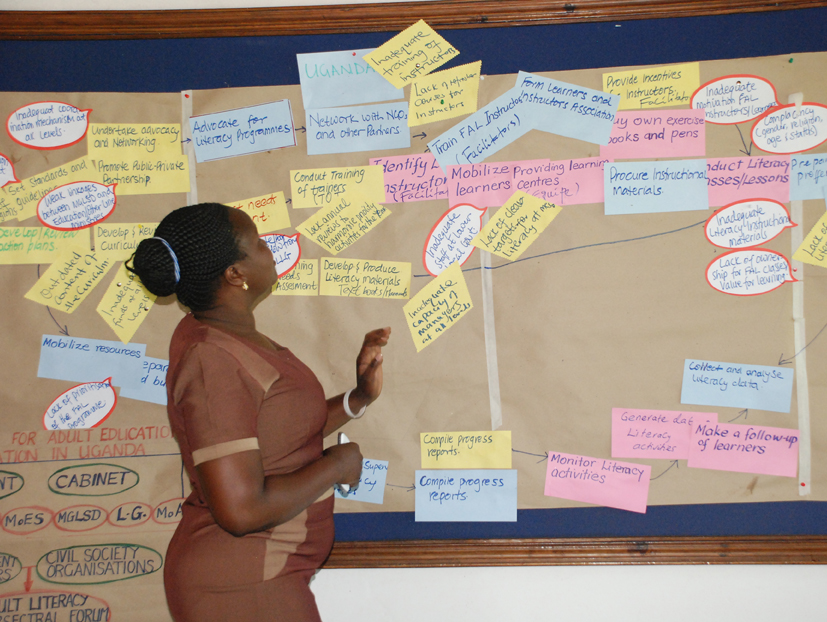When perusing the literature, discourse and practice of adult education, specifically adult literacy, it is interesting to note that the majority of authors refer to “adult literacy provision”. However, when we look at the literature and practices of the health, agriculture and other sectors, it seems that the terminology changes and the words “service delivery” are introduced. One may ask whether this matters. It seems it does, because it changes the way we think about our target group, what and how we offer what we think they need. We also know that governments are responsible for the delivery of services to their citizens – and this leans more toward a rights-based approach. So, referring to adult education service delivery would imply a stronger undertone to what we do. It would imply that adults deserve and have a right to quality adult education services. It also “forces” us to look at a holistic adult education system than can actually manage to deliver this service on the ground to the people, in a manner which ensures quality.
This kind of thinking, coupled with the fact that most of the countries in the East of Africa still have illiteracy rates ranging between 20-30%, and even higher in some places, in spite of all of them implementing large scale adult literacy programmes (both by government and the NGO sector), led to a regional workshop on adult education service delivery optimisation held in Uganda in 2014. The surprising outcomes of this and the related workshops which followed placed DVV International’s work in the region on a new trajectory. Through the use of different tools (borrowed from the fields of public administration and service delivery optimisation), such as process maps, cause and effect diagrams, etc., each country managed to identify the steps in their service delivery chain from macro to micro level, and more importantly the blockages in the chain of service delivery.
Structures and institutional arrangements as well as management processes hampered the delivery of services the most
The causes and effects of these blockages have been further analysed. What transpired enabled the region to develop a conceptual framework of all the building blocks to put a comprehensive adult education system in place. In both Uganda and Ethiopia, it became clear that policies, strategies and guidelines were in place already to render an enabling environment for adult education services. What was lacking was an improved conceptual and technical orientation of integrated adult education services (literacy coupled with livelihoods and life skills training, business training, etc.), including methodologies, manuals, etc., to build capacity to deliver such services. More importantly, structures and institutional arrangements as well as management processes such as planning, budgeting, coordination and M&E hampered the delivery of services the most. Therefore this calls for a total re-orientation of the system and the addressing of each sphere and building block of an adult education system across the micro, meso and macro levels.
Since 2014, both Uganda and Ethiopia have started on a new road of Adult Education System Strengthening using service delivery optimisation tools. Based on the context and status of each country, as far as adult education services are concerned, different entry points were pursued. Uganda, with DVV International’s assistance, has developed a new, integrated adult education approach called ICOLEW (Integrated Community Learning for Wealth Creation) in line with their Vision 2040. The starting point was therefore more from the technical perspective, but institutional structures and management processes are addressed alongside this re-orientation, using 3 pilot districts to test and then up-scale best practices.
Ensuring adult education service delivery that will include literacy, livelihoods skills training and life skill training
Ethiopia already has an integrated approach called IFAE (Integrated Functional Adult Education) in place, but the concept needs to be elaborated with more technical support. Furthermore, institutional arrangements and management processes need to be changed and aligned to enable an integrated service across sectors, ultimately ensuring adult education service delivery that will include literacy, livelihoods skills training, life skill training, etc. These services will be delivered in newly established Community Learning Centres (CLCs) amongst others. Four pilot regions are currently part of a 5-phase service delivery optimisation process.
Over the past 3 years the original workshop in 2014 and the exchange of ideas around this concept have re-energised adult education practitioners and academics in both countries. We have managed to present new, more relevant concepts and roll out ideas to politicians and high level decision-makers that address current needs in the countries better. This has led to a re-consideration of allocating budgets and bringing other sector offices such as agriculture and TVET on board. As we are developing the new approach through an action-learning orientation, we hope to ultimately ensure that adults have access to improved adult education services to improve their livelihood




